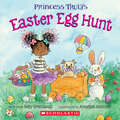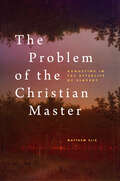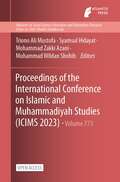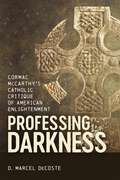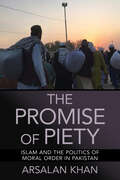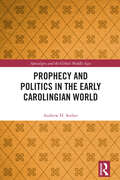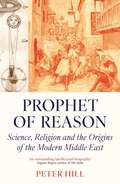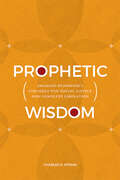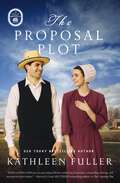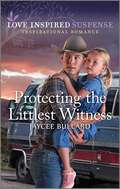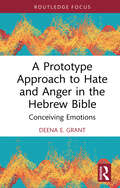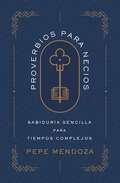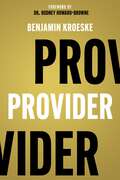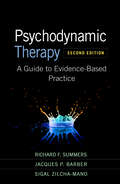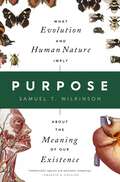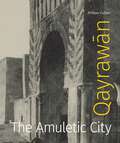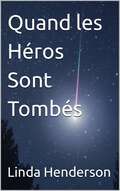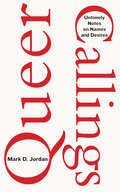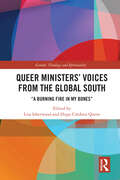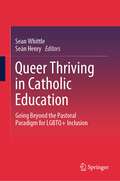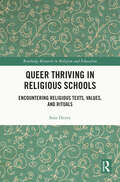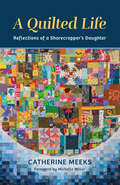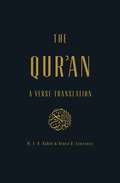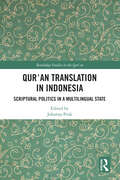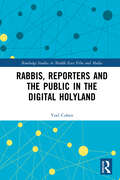- Table View
- List View
Princess Truly's Easter Egg Hunt (Princess Truly)
by Kelly GreenawaltJoin Princess Truly on a magical Easter egg hunt!It's time for an Easter party! Princess Truly and her dog, Sir Noodles, are on the hunt for eggs and treats. There's a special guest at the party -- the Easter Bunny! But when it's the Easter Bunny's time to go, his wagon gets stuck! Princess Truly knows exactly what to do. With a shake of her magical, sparkling curls, she helps the Easter Bunny get on his way and saves the day!With its sweet rhyming text and adorable illustrations, Princess Truly's Easter Egg Hunt is the perfect Easter basket gift and springtime read!
The Problem of the Christian Master: Augustine in the Afterlife of Slavery
by Matthew EliaA bold rereading of Augustinian thought for a world still haunted by slavery Over the last two decades, scholars have made a striking return to the resources of the Augustinian tradition to theorize citizenship, virtue, and the place of religion in public life. However, these scholars have not sufficiently attended to Augustine&’s embrace of the position of the Christian slaveholder. To confront a racialized world, the modern Augustinian tradition of political thought must reckon with its own entanglements with the afterlife of the white Christian master. Drawing Augustine&’s politics and the resources of modern Black thought into extended dialogue, Matthew Elia develops a critical analysis of the enduring problem of the Christian master, even as he presses toward an alternative interpretation of key concepts of ethical life—agency, virtue, temporality—against and beyond the framework of mastery. Amid democratic crises and racial injustice on multiple fronts, the book breathes fresh life into conversations on religion and the public square by showing how ancient and contemporary sources at once clash and converge in surprising ways. It imaginatively carves a path forward for the enduring humanities inquiry into the nature of our common life and the perennial problem of social and political domination.
Proceedings of the International Conference on Islamic and Muhammadiyah Studies (Advances in Social Science, Education and Humanities Research #773)
by Triono Ali Mustofa Syamsul Hidayat Mohammad Zakki Azani Muhammad Wildan ShohibThis is an open access book. We cordially invite you to submit your papers for the International Conference on Islamic and Muhammadiyah Studies (ICIMS) 2023, This conference is part of a conference program called International Summit on Science Technology and Humanity (ISETH) 2022 Organized by Universitas Muhammadiyah Surakarta. This conference will be hosted online from Surakarta, Indonesia on 11–12 January 2023.
Professing Darkness: Cormac McCarthy's Catholic Critique of American Enlightenment
by D. Marcel DeCosteProfessing Darkness confirms the centrality of Catholic thought, imagery, and sacrament to the spiritual and ethical outlook of the work of Cormac McCarthy and, more specifically, its consistent assessment of Enlightenment values and their often-catastrophic realization in American history. D. Marcel DeCoste surveys McCarthy’s fiction from both his Tennessee and Southwest periods, with chapters devoted to eight of his published novels—from Outer Dark to The Road—and a conclusion that examines the writer’s screenplay for The Counselor and the duology of The Passenger and Stella Maris. DeCoste’s attentive, wide-ranging interpretations demonstrate that McCarthy’s work mounts a sustained critique of core Enlightenment ideals and their devastating results in the American context, especially for Indigenous peoples, the environment, the viability of community, and the integrity of a self irreducible to the status of a commodity. Professing Darkness shows that Roman Catholic understandings of Penance and Eucharist, along with specific Catholic teachings—such as those regarding the goodness of Creation, the nature of evil, the insufficiency of the self, and the radical invitation to conversion—enable McCarthy’s revelatory engagement with American Enlightenment. An important contribution to the ever-expanding critical literature on a towering contemporary author, Professing Darkness offers an innovative reading of both the spiritual and political valences of McCarthy’s writing.
The Promise of Piety: Islam and the Politics of Moral Order in Pakistan
by Arsalan KhanIn The Promise of Piety, Arsalan Khan examines the zealous commitment to a distinct form of face-to-face preaching (dawat) among Pakistani Tablighis, practitioners of the transnational Islamic piety movement the Tablighi Jamaat. This group says that Muslims have abandoned their religious duties for worldly pursuits, creating a state of moral chaos apparent in the breakdown of relationships in the family, nation, and global Islamic community. Tablighis insist that this dire situation can only be remedied by drawing Muslims back to Islam through dawat, which they regard as the sacred means for spreading Islamic virtue. In a country founded in the name of Muslim identity and where Islam is ubiquitous in public life, the Tablighi claim that Pakistani Muslims have abandoned Islam is particularly striking. The Promise of Piety shows how Tablighis constitute a distinct form of pious relationality in the ritual processes and everyday practices of dawat and how pious relationality serves as a basis for transforming domestic and public life. Khan explores both the promise and limits of the Tablighi project of creating an Islamic moral order that can transcend the political fragmentation and violence of life in postcolonial Pakistan.
Prophecy and Politics in the Early Carolingian World (Apocalypse and the Global Middle Ages)
by Andrew SorberProphetic and apocalyptic rhetoric play critical roles in the development and articulation of political authority in the reigns of Charlemagne (d. 814) and Louis the Pious (d. 840). The rhetorical authority derived from claims of receiving revelation, interpreting divine communication, speaking for God, and foreseeing calamities became a competitive medium through which individuals legitimized political behaviour, debated their long- and short-term aspirations, and struggled for political supremacy. Ranging from claims of revelations, dreams, and visions, to the adoption of rhetorical voices based on biblical prophets, to the interpretation of signs and portents, prophetic rhetoric enjoyed extensive experimentation and varied application throughout early medieval political discourse.Prophecy and Politics in the Early Carolingian World argues that claims of divine revelation, resistant to any attempts to monopolize them, provided a powerful means of speaking with authority for all participants in Frankish political discourse. This authority proved instrumental in the articulation and dismantling of effective Carolingian royal authority from 768 to 840. The volume introduces and reinterprets early Carolingian political discourse and intellectual activity, as well as the centrality of apocalypticism in the Carolingian period, by emphasizing prophecy, or revelation and authority, rather than prediction and calamity.Early Carolingian political discourse was a dialogue that took place across royal proclamations, legal statements, historical texts, visions, scriptural commentaries, and manifestations of the natural world, and in this dialogue, the ability to interpret God’s will was as powerful as it was problematic.
Prophet of Reason: Science, Religion and the Origins of the Modern Middle East
by Peter Hill'An outstanding intellectual biography.' Eugene Rogan In 1813, high in the Lebanese mountains, a thirteen-year-old boy watches a solar eclipse. Will it foretell a war, a plague, the death of a prince? Mikha&’il Mishaqa&’s lifelong search for truth starts here. Soon he&’s reading Newtonian science and the radical ideas of Voltaire and Volney: he loses his religion, turning away from the Catholic Church. Thirty years later, as civil war rages in Syria, he finds a new faith – Evangelical Protestantism. His obstinate polemics scandalise his community. Then, in 1860, Mishaqa barely escapes death in the most notorious event in Damascus: a massacre of several thousand Christians. We are presented with a paradox: rational secularism and violent religious sectarianism grew up together. By tracing Mishaqa&’s life through this tumultuous era, when empires jostled for control, Peter Hill answers the question: What did people in the Middle East actually believe? It&’s a world where one man could be a Jew, an Orthodox Christian and a Sunni Muslim in turn, and a German missionary might walk naked in the streets of Valletta.
Prophetic Wisdom: Engaged Buddhism's Struggle for Social Justice and Complete Liberation (SUNY series in Religious Studies)
by Charles R. StrainClassical Buddhism lacked an understanding of systemic injustice and its contribution to collective suffering. Despite the teaching of impermanence, classical Buddhist schools viewed social institutions as given and offered no path to social transformation. Today, Buddhists are shaped by multiple religious and secular traditions, including those stemming from the Hebrew prophets. The prophetic tradition offers a socially and religiously powerful concept—the concept of justice—that reconfigures the Buddhist dharma.In a time of unparalleled peril, Buddhists are challenged as never before to turn wisdom into strategic action to foster systemic social change. Compassion is not enough. Prophetic Wisdom shows how Engaged Buddhists can expand their understanding of the causes of collective suffering and develop nonviolent means for social transformation through a dialectic of love, power, and justice. It concludes by confronting the poison of racism in the American body politic.
The Proposal Plot (An Amish of Marigold Novel #2)
by Kathleen FullerA headstrong young businesswoman. An unlucky-in-love bachelor. And the chaperoning assignment that keeps pushing them together.For someone so strong-willed and certain, Ella Yoder has never been more unsure of her life. It's been a year since she convinced her father to move with her and her younger sister Junia to Marigold, Ohio, to open E and J Grocery. Ella's got a keen eye for running a business and has big dreams to expand. But her plans are stalled because Junia refuses to lift a finger at the store--or listen to her about anything.Nelson Bontranger knows one thing for sure: creating his own artisan deli meats is his passion. Well, maybe one other thing: he's sworn off women forever. After two bouts of heartbreak, he's not willing to open up himself to a third. When he eyes his own butcher shop next to E and J Grocery in Marigold, he's surprised to learn that Ella has had her eye on the property for some time. He doesn't trust this stubborn, pushy young woman--and for her, the feeling is mutual.Against their wishes, Ella and Nelson's paths continue to cross when Nelson's nephew Malachi falls head over heels for Junia. Nelson and Ella are brought together to keep the lovebirds in check, but somewhere along the line, their frustration turns to something altogether more pleasant. But they will both need to come to terms with past pain before they can find their future happiness.
Protecting the Littlest Witness
by Jaycee BullardCan he save a child… from an unknown threat? After her brother-in-law is imprisoned for murdering her sister, Etta Mitchell will do anything to keep her five-year-old niece—a potential witness—safe. But when their home is broken into, resulting in the assailant&’s death, Etta has no choice but to accept help from her ex-fiancé, Steven Hunt. Can they bring a criminal to justice and protect her niece…before hit men track them down?From Love Inspired Suspense: Courage. Danger. Faith.
A Prototype Approach to Hate and Anger in the Hebrew Bible (Routledge Interdisciplinary Perspectives on Biblical Criticism)
by Deena E. GrantThis innovative book applies findings from the field of cognitive linguistics to the study of emotions in the Hebrew Bible. The book draws on the prototype approach to conceptual categories to help interpret emotion language in biblical passages. Contemporary scholarship has come to recognize that biblical emotion terms do not necessarily possess exact equivalents within our modern lexicons, even if some of these terms express (or appear to express) concepts similar to those conveyed by modern emotion language. In particular, the book focuses on sn’ and ḫrh, which are almost always equated in modern English with hate and anger. However, the ancient Hebrew roots evoke varied and robust emotion-scripts that are quite different than their English counterparts. We see how the prototype script model may help to expose the unique nuances of sn’ and ḫrh and put into profile elements of these emotions that may otherwise go unnoticed. Overall, the study demonstrates that even though modern emotion terms cannot fully capture the ancient emotional experience, our shared use of language to evoke meaning offers us entrée into the emotional world represented in the Hebrew Bible.
Proverbios para necios: Sabiduría sencilla para tiempos complejos
by Pepe MendozaEn Proverbios para necios, Pepe Mendoza desglosa cada capítulo de Proverbios de forma ligera y coloquial para mostrar cómo se aplica a nuestra vida cotidiana y contemporánea.En el viaje de la vida, la necedad suele llevarnos por senderos equivocados, causando daño no solo a nosotros mismos, sino también a quienes nos rodean. La sabiduría, por otro lado, comienza con el reconocimiento de que Dios es soberano y que solo conociéndolo y obedeciéndolo podemos alcanzar la vida plena que anhelamos.En este libro, Pepe Mendoza anima a los lectores a buscar el sabio consejo de las Escrituras y a despojarse de su propia necedad para vivir de forma beneficiosa, productiva y saludable.Cada uno de los 31 capítulos incluye:El capítulo completo de ProverbiosUn análisis del proverbioUn dilema contemporáneo general presentado como "necedad" que nos afecta a todosAplicaciones para la vida cotidianaReflexiones que culminan con el evangelioEntre los temas, los lectores encontrarán:El necio siempre se pasa de la rayaLa necedad sin límites en el mundo virtualEl necio habla, pero no concretaLos secretos de una amistad sabia y verdadera con el SeñorProverbios para necios ilustra un camino claro lejos de la necedad, instándote a buscar la sabiduría con fervor. Aprovecha la oportunidad de transformar tus elecciones, dejar atrás la necedad y emprender un viaje hacia una vida de cumplimiento duradero.Proverbs for FoolsIn Proverbs for Fools, Pepe Mendoza breaks down each chapter of Proverbs in a light and colloquial way to show how it applies to our daily and contemporary lives.In life's journey, foolishness often leads us down wrong paths, causing harm not only to ourselves, but also to those around us. Wisdom, on the other hand, begins with the recognition that God is sovereign and that only by knowing and obeying him can we achieve the full life we long for.In this book, Pepe Mendoza encourages readers to seek the wise counsel of Scripture and to shed their own foolishness in order to live beneficially, productively, and healthfully.Each of the 31 chapters includes:The complete chapter from Proverbs.An analysis of the proverbA general contemporary dilemma presented as "foolishness" that affects us all.Applications for everyday lifeReflections culminating in the gospelAmong the themes, readers will find:The fool always oversteps the markFoolishness without limits in the virtual worldThe fool speaks, but does not actSecrets of a wise and true friendship with the LordProverbs for Fools illustrates a clear path away from foolishness, urging you to seek wisdom with fervor. Seize the opportunity to transform your choices, leave foolishness behind and embark on a journey toward a life of lasting fulfillment.
Provider
by Benjamin KroeskeProvider: A Journey into Faith, Abundance, and Unwavering Trust in God's Endless ProvisionFrom the Author of 'The Glorious Church'Many people know God as their Savior and others know Him as their Healer, but how often do we truly experience Him as our Provider? Benjamin Kroeske invites you to discover a magnificent truth hidden within the pages of God's Word. Throughout the Bible, God unveils Himself as the Provider, and His longing is to manifest this truth in your life.For the past decade, Benjamin Kroeske has journeyed through the provident heart of God. Amidst diverse circumstances, he has borne witness to the unwavering faithfulness of a God who cares for His children with boundless love and pleasure, not only meeting their needs but also fulfilling the deepest desires of their hearts.Drawing from the wellspring of God's Word, Kroeske uncovers profound insights into God's heart regarding provision. Time and again, he has experienced the Father's loving hand, providing abundantly for his family. Now, he's excited to share these invaluable insights and experiences with you.Whether you're a single mother striving to provide for your family or a businessman seeking God's provision in your endeavors, "Provider" promises to deepen your understanding of the boundless love residing in God's heart for His children. This book isn't just an encouragement; it's a challenge, an igniting force for your faith, and an empowering guide to trust God for remarkable provisions.Unlock the profound mysteries of God's provision and discover the boundless love and generosity He has reserved for you. Enter into a world of faith, abundance, and unwavering trust in God's endless provision.About The AuthorShortly after Ben gave his life to Jesus in 2006, he moved to Tampa, Florida, to attend the Bible school connected with the ministry of Drs. Rodney and Adonica Howard-Browne. There he met his wife Jacky, and they married in 2010. After serving faithfully for six years in different facets of the ministry, Ben and Jacky felt God's call to start a church in the Netherlands: The River Amsterdam. With their daughter of almost a year, they moved to the Netherlands with a burning passion to see people have an encounter with Jesus and flourish in their God-given potential.
Psychodynamic Therapy: A Guide to Evidence-Based Practice
by Richard F. Summers Jacques P. Barber Sigal Zilcha-ManoFirmly grounded in contemporary clinical practice and research, this pragmatic guide for professionals and students is now in a revised and expanded second edition. The book explains the theory underlying psychodynamic approaches and lays out a model for understanding psychopathology. Vivid case examples demonstrate how to tailor psychodynamic therapy effectively for individual patients. The authors provide a framework for diagnosing the patient&’s core psychodynamic problem and engaging the most useful mechanisms of change, using an integrative approach. Special topics include remote and hybrid treatment, combining therapy with psychopharmacology, and working with couples and families. New to This Edition *Incorporates cutting-edge research on psychotherapy process and mechanisms of change. *Chapter on telepsychotherapy, including clear recommendations for practice. *More attention to the social determinants of health--the psychic effects of adversity and various forms of oppression. *New and revised case examples, with diversity in age, gender, race, culture, and sexual identity. See also Practicing Psychodynamic Therapy: A Casebook, edited by Summers and Barber, which features 12 in-depth cases that explicitly illustrate the approach in this book.
Purpose: What Evolution and Human Nature Imply about the Meaning of Our Existence
by Samuel T. WilkinsonBy using principles from a variety of scientific disciplines, Yale Professor Samuel Wilkinson provides a framework for human evolution that reveals an overarching purpose to our existence. Generations have been taught that evolution implies there is no overarching purpose to our existence, that life has no fundamental meaning. We are merely the accumulation of tens of thousands of intricate molecular accidents. Some scientists take this logic one step further, suggesting that evolution is intrinsically atheistic and goes against the concept of God. But is this true? By integrating emerging principles from a variety of scientific disciplines—ranging from evolutionary biology to psychology—Yale Professor Samuel Wilkinson provides a framework of evolution that implies not only that there is an overarching purpose to our existence, but what this purpose is. With respect to our evolution, nature seems to have endowed us with competing dispositions, what Wilkinson calls the dual potential of human nature. We are pulled in different directions: selfishness and altruism, aggression and cooperation, lust and love. When we couple this with the observation that we possess a measure of free will, all this strongly implies there is a universal purpose to our existence. This purpose, at least one of them, is to choose between the good and evil impulses that nature has created within us. Our life is a test. This is a truth, as old as history it seems, that has been espoused by so many of the world&’s religions. From a certain framework, these aspects of human nature—including how evolution shaped us—are evidence for the existence of a God, not against it. Closely related to this is meaning. What is the meaning of life? Based on the scientific data, it would seem that one such meaning is to develop deep and abiding relationships. At least that is what most people report are the most meaningful aspects of their lives. This is a function of our evolution. It is how we were created.
Qayrawān: The Amuletic City (Refiguring Modernism)
by William GalloisIn the last years of the nineteenth century, the Tunisian city of Qayrawān suddenly found itself covered in murals. Concentrated on and around the city’s Great Mosque, these monumental artworks were only visible for about fifty years, from the 1880s through the 1930s. This book investigates the fascinating history of who created these outdoor paintings and why.Using visual archaeological methods, William Gallois reconstructs the visual history of these works and vividly brings them back to life. He locates pictorial records of the murals from the backdrops of photographs, postcards, and other forms of European ephemera. In Qayrawān, he identifies a form of religious painting that transposed traditional aesthetic forms such as house decoration, embroidery, and tattooing—which lay exclusively within the domains of women—onto the body of a conquered city. Gallois argues that these works were created by women as a form of “emergency art,” intended to offer amuletic protection for the community, and demonstrates how they differ markedly from “classical” Islamic antecedents and modern modes of Arab cultural production in the Middle East and North Africa.Based on extensive archival research, this study is both a record of a unique moment in the history of art and a challenge to rethink the spiritual force and agency of a group of anonymous female artists whose paintings aspired to help save the world at a time of great peril. It will be welcomed by scholars of art history, Islamic studies, Middle East studies, and the history of magic.
Quand les Héros Sont Tombés
by Linda HendersonRenaître des cendres de la défaite à la victoire ! Les empires se sont succédé. Des personnalités de la télévision se sont élevées et ont disparu. Des sociétés sont devenues des entreprises multimillionnaires, puis ont fait faillite. Des mariages ont commencé par des débuts romantiques, des contes de fées, puis se sont terminés par un divorce. N'y a-t-il pas d'espoir pour ceux qui ont atteint leur apogée, mais qui se sont ensuite effondrés ? Si, tout n'est pas perdu ! Linda Henderson partage des vérités bibliques et des exemples de ceux qui sont tombés, mais qui, tel un phénix, renaissent de leurs cendres.
Queer Callings: Untimely Notes on Names and Desires
by Mark D. JordanA passionate exhortation to expand the ways we talk about human sex, sexuality, and gender.Twenty-five years ago, Mark D. Jordan published his landmark book on the invention and early history of the category “sodomy,” one that helped to decriminalize certain sexual acts in the United States and to remove the word sodomy from the updated version of a standard English translation of the Christian Bible. In Queer Callings, Jordan extends the same kind of illuminating critical analysis to present uses of “identity” with regard to sexual difference. While the stakes might not seem as high, he acknowledges, his newest history of sexuality is just as vital to a better present and future.Shaking up current conversations that focus on “identity language,” this essential new book seeks to restore queer languages of desire by inviting readers to consider how understandings of “sexual identity” have shifted—and continue to shift—over time. Queer Callings re-reads texts in various genres—literary and political, religious and autobiographical—that have been preoccupied with naming sex/gender diversity beyond a scheme of LGBTQ+ identities. Engaging a wide range of literary and critical works concerned with sex/gender self-understanding in relation to “spirituality,” Jordan takes up the writings of Oscar Wilde, Marcel Proust, Djuna Barnes, Samuel R. Delany, Audre Lorde, Geoff Mains, Eve Kosofsky Sedgwick, Gloria Anzaldúa, Maggie Nelson, and others.Before it’s possible to perceive sexual identities differently, Jordan argues, current habits for classifying them have to be disrupted. In this way, Queer Callings asks us to reach beyond identity language and invites us to re-perform a selection of alternate languages—some from before the invention of phrases like “sexual identity,” others more recent. Tracing a partial genealogy for “sexual identity” and allied phrases, Jordan reveals that the terms are newer than we might imagine. Many queer folk now counted as literary or political ancestors didn’t claim a sexual or gender identity: They didn’t know they were supposed to have one. Finally, Queer Callings joins the writers it has evoked to resist any remaining confidence that it’s possible to give neatly contained accounts of human desire. Reaching into the past to open our eyes to extraordinary opportunities in our present and future, Queer Callings is a generatively destabilizing and essential read.
Queer Ministers’ Voices from the Global South: "A Burning Fire in My Bones" (Gender, Theology and Spirituality)
by Lisa Isherwood Hugo Córdova QueroThis book brings together the narratives of diverse ministers from the Global South in order to show that queer theologies are impacting many parts of the world and queer lives are molding and enriching Christian ministry. Across Asia, Africa, and Latin America, we are witnessing the emergence of queer faith-based communities in very different contexts and with very different histories. The perspectives included in the book form a tapestry that honors diversity among the Global South’s queer communities and ministries. They demonstrate the various ways in which queer ministry challenges and changes theological understanding as well as religious practice. Each chapter highlights issues pertaining to liturgy, sacraments, pastoral rites, and the personal faith journey that each minister underwent to foster pastoral queer theologies. Contributors focus on their understanding of the relationship between faith and sexuality, how rituals relate to the daily lives of queer believers, and the struggles they face within the political structures of religious institutions. The narratives highlight some of the challenges and mechanisms deployed to cope with ingrained LGBTIQ+ phobia. They also evidence how communities enact interreligious and multi-religious dialog and rituals while honoring faith and activism, and how prophetic ministries counter oppressive discourses and colonial performativities. This is a valuable resource for academics and religious leaders interested in the study of queer theologies, Asian, African, and Latin American Christianity, as well as ecclesiastical and liturgical issues.
Queer Thriving in Catholic Education: Going Beyond the Pastoral Paradigm for LGBTQ+ Inclusion
by Sean Whittle Seán HenryThis book provides readers with the opportunity to go beyond anecdote and supposition in order to get a fuller grasp of research around Catholic education and LGBTQ+ matters. This is an edited collection of chapters which explores LGBTQ+ matters in relation to Catholic education. Although the field of Catholic Education Studies has grown exponentially over the past two decades, little if any attention has been published specifically about the place of LGBTQ+ students (and teachers) in the context of Catholic education. This edited book presents the various strands of research about Catholic education and LGBTQ+ inclusion. More specifically, this edited book of chapters addresses a number of broader themes including:• Is it possible for Catholic education to sit in harmony with the concerns of LGBTQ+ inclusive education?• What does it mean to ‘queer’ education at all? How does this sit in relation to Catholic perspectives on the purpose of Catholic education?• When it comes to LGBTQ+ issues in relation to Catholic education, what is the research agenda?• How might Catholic schools move beyond a ‘pastoral accommodation’ approach to LGBTQ+ students?• What does the evidence from research in Catholic schools indicate? Are they places of inclusion, hospitality, and welcome for LGBTQ+ young people?
Queer Thriving in Religious Schools: Encountering Religious Texts, Values, and Rituals (Routledge Research in Religion and Education)
by Seán HenryThis book offers an account of religious schooling committed to ‘queer-thriving’ and envisions how queer staff and students can live their lives without being ‘accommodated’ within heteronormative religious traditions.Engaging with queer theological perspectives across the Jewish, Christian, and Muslim traditions, the book begins by situating queer thriving as a viable part of the work of the religious school, and not just as something reserved for progressive education more broadly. Taking three areas that are typically used to justify religious heteronormativity (religious texts, religious values, religious rituals), it engages queer theologies to showcase how an educational approach committed to queer thriving can be enacted in religious schools in ways that are also theologically sensitive. The book then explores how religious school communities can navigate differences around queerness and religion in ways that are supportive of queer staff and students. It takes desire as an everyday reality in classrooms and applies a queer lens to this to challenge heteronormativity and to imagine alternative modes of relationship between staff, students, and communities that enable queer staff and students to thrive.Showcasing possibilities of resistance for the opposition between religious and queer concerns, it will appeal to researchers, postgraduates and academics in the fields of religion and education, whilst also benefitting those working across philosophy of education and educational theory, sex education, sociology of education, social justice education, queer theologies, religious studies, and sociology of religion.
A Quilted Life: Reflections of a Sharecropper's Daughter
by Catherine MeeksCatherine Meeks shares the wisdom she has garnered over the journey of her life, from her father&’s sharecropping fields to the academy and beyond. Today, Catherine Meeks is a national leader of racial healing and an esteemed retired professor of African American studies. But being a Black woman in America can be difficult. Join Meeks as she describes the adventures and adversity she encountered on her path to becoming an empowered voice for change. Growing up in Arkansas under the terror of Jim Crow, Meeks learned firsthand about injustice and the desperation it causes. But with the support of her family, she moved to LA to study at Pepperdine. When a Black teenager was killed by a campus security guard, Meeks awakened to her prophetic voice, and a local women&’s group gave her hope that racial reconciliation was possible. She later led a group of students to West Africa, where she met her husband. Yet her years-long battle with rheumatoid arthritis severed their relationship, leaving her a single mother. Meanwhile, she worked tirelessly at Mercer University to expand the African American studies program, all while earning her MSW and PhD. Quilting together these memories—bitter and sweet, traumatic and triumphant—Meeks shares her hard-earned wisdom: Learn how to discern the Creator&’s work. Listen to the voice saying &“yes&” to opportunity. Become a wounded healer. Know when to practice silence and when to speak out. Readers will leave the pages of A Quilted Life enriched by Meeks&’s unique perspective and insight.
The Qur'an: A Verse Translation
by M.A.R. Habib Bruce B. LawrenceIslam’s founding text, rendered for the first time in flowing English verse. This monumental feat of translation, the product of a ten-year-long collaboration between one of our most respected scholars of Islam (Bruce B. Lawrence) and a poet and scholar of literature (M. A. R. Habib), The Qur'an: A Verse Translation offers readers the first rendering in English to echo, in accessible and fluent verse, the sonorous beauty of the Arabic original as well as the complex nuances of its meaning. Those familiar with the Qur'an in Arabic—especially the faithful who each day hear the text recited aloud—know that it is a sublime blend of sound and sense, music and meaning. While no translation can perfectly capture the inimitable virtues of the original, Habib and Lawrence have come closest to a readable, clear, and fluid English Qur'an that all readers, regardless of their faith or familiarity with the text, can read with pleasure, gaining a deeper appreciation of the book and the religious tradition it inspired. A rich and informative introduction situates the Qur'an in its cultural context and describes its unique structure and history. A note from the translators explains their painstaking efforts to address the many challenges that any translator must face when rendering the Qur'an into English. Extensive notes and explanatory apparatus will help all readers—whether they are familiar with the original or coming to the text for the first time—to read (and hear) the Qur'an with fresh understanding and insight.
Qur'an Translation in Indonesia: Scriptural Politics in a Multilingual State (Routledge Studies in the Qur'an)
by Johanna PinkThis book provides a comprehensive survey of Qur’an translation in Indonesia – the most populous Muslim-majority country in the world with a highly diverse, multilingual society. Delving into the linguistic and political dimensions of this field, the contributors – many of whom are Indonesian scholars – employ a wide range of historical, socio-cultural, linguistic and exegetical approaches to offer fresh insights. In their contributions, the negotiation of authority between state and of non-state actors is shown to be a constant theme, from the pre-print era through to the colonial and postcolonial periods. Religious organizations, traditional institutions of scholarship and Wahhabi-Salafi groups struggle over the meaning of the Qur’an while the Ministry of Religious Affairs publishes its own Qur’an translations into many of the country’s languages. The contributors also explore the influential role of the Ahmadiyya movement in shaping Qur’an translation in Indonesia. Moreover, they examine the specific challenges that translators face when rendering the Qur’an in languages with structures, histories and cultural contexts that are vastly different from Arabic. Opening up the work of Indonesian scholars to a wider audience, this book will appeal to anyone interested in Qur’anic studies and Islam in the Southeast Asia region.
Rabbis, Reporters and the Public in the Digital Holyland (Routledge Studies in Middle East Film and Media)
by Yoel CohenFocused on the triangular relationship between rabbis, journalists and the public, this book analyses each group’s role in influencing the agenda around religion in Israel. The book draws upon the author's original research, comprising an analysis of the coverage of religion on four Israeli news websites, a series of surveys of rabbis, journalists, and the public, as well as a large number of interviews conducted with a range of stakeholders: community rabbis, teacher rabbis, and religious court judges; reporters, editors, and spokespersons; and the Israeli Jewish public. Key questions include: What are rabbis’ philosophical views of the media? How does the media define news about Judaism? What aspect of news about religion and spirituality interest the public? How do spokespersons and rabbis influence the news agenda? How is the triangular relationship between rabbis, journalists and the public being altered by the digital age? Despite a lack of understanding about mass media behaviour among many rabbis, and, concurrently, a lack of knowledge about religion among many journalists, it is argued that there is shared interest between the two groups, both in support of mass-media values like the right to know and freedom of expression. It is further argued that the public's attitude to news about religion is significant in determining what journalists should publish. The book will be of interest to those studying mass communications, the media, Judaism and Israeli society, as well as researchers of media and religion.
